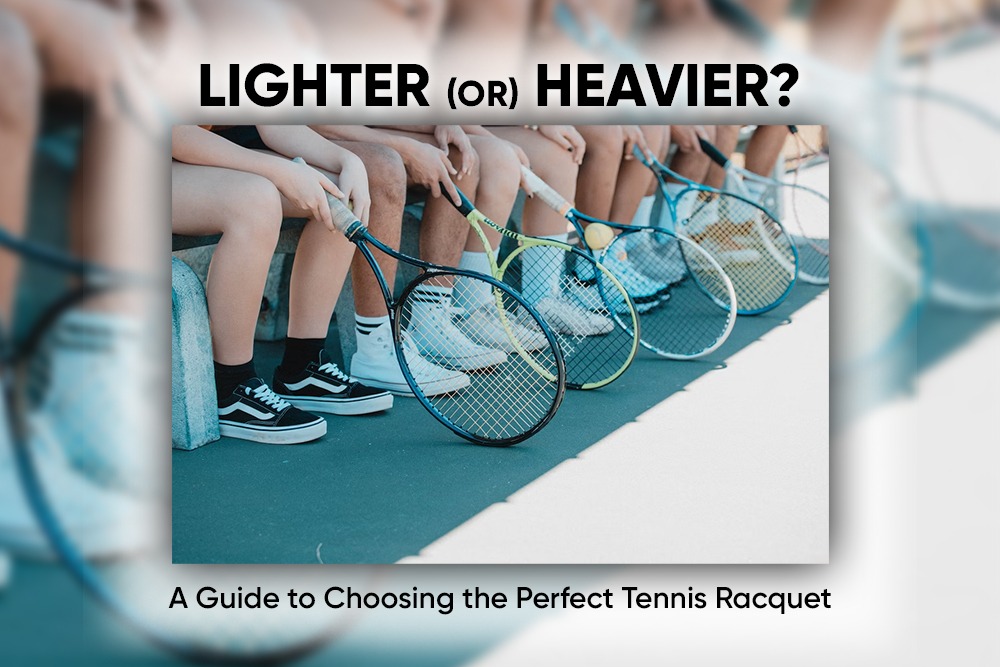Introduction:
When it comes to choosing a tennis racquet, one of the most important decisions you'll make is selecting the right weight. The weight of your racquet can significantly impact your game, affecting your power, control, and overall performance on the court. In this blog post, we'll dive into the debate between lighter and heavier tennis racquets, exploring the pros and cons of each option. By the end, you'll have a better understanding of which racquet weight suits your playing style and goals.
Lighter Tennis Racquets:
Exploring the advantages of lighter racquets: maneuverability, quick swings, and enhanced control. How lighter racquets benefit players with a defensive or aggressive baseline style. Highlighting the improved racquet speed and spin potential with lighter options. Discussing potential drawbacks, such as reduced stability and power. Here are some reasons why you might consider a lighter racquet:
a) Increased Swing Speed: Lighter racquets allow for faster swing speeds, enabling you to generate more racket head speed and power in your shots.
b) Enhanced Maneuverability: With a lighter racquet, you can react quickly to fast shots, making it easier to change direction and move around the court.
c) Reduced Arm Fatigue: Lighter racquets can be less demanding on your arm muscles, minimizing the risk of fatigue and injury during long matches or intense training sessions.
d) Suitable for Beginners and Junior Players: Lighter racquets are often recommended for beginners or junior players who are still developing their technique and strength.
Heavier Tennis Racquets:
Examining the benefits of heavier racquets: power, stability, and increased plow-through. How heavier racquets suit players with a strong, aggressive playing style. Discussing the potential drawbacks, including reduced maneuverability and increased arm fatigue. Exploring the role of heavier racquets in minimizing vibrations and shock absorption.
Consider the following advantages of choosing a heavier racquet:
a) Increased Stability: Heavier racquets provide more stability and solidity on impact, allowing for better control and accuracy in your shots.
b) Enhanced Power: The additional weight of a heavier racquet can generate more power, especially for players who have developed a strong technique and swing.
c) Absorbs Vibrations: Heavier racquets tend to absorb more shock and vibrations, which can be advantageous for players who suffer from arm or wrist discomfort.
d) Suitable for Advanced Players: Experienced players with a refined technique and strength can benefit from the added control and power that a heavier racquet provides.
Choosing the Right Racquet Weight:
- Evaluating your playing style, physical condition, and skill level to determine the ideal racquet weight.
- Considering the importance of balance and swing weight alongside overall racquet weight.
- The significance of trying out different racquets before making a final decision.
- Seeking guidance from tennis professionals or experts in selecting the right weight for your specific needs.
Additional Factors to Consider:
- Grip size and its influence on comfort and control.
- String tension and its impact on racquet weight perception.
- Personal preferences and adjustments for individual playing styles.
Also Read: Racquet Buying Guide
Conclusion:
Selecting the appropriate weight for your tennis racquet is a crucial decision that can greatly impact your performance on the court. While lighter racquets offer maneuverability and control, heavier racquets provide power and stability. By considering your playing style, physical abilities, and individual preferences, you can make an informed choice that optimizes your tennis experience. Remember, there is no one-size-fits-all answer; the perfect weight depends on finding the right balance that complements your unique game.
Related Blog: Things to Know before Selecting a Tennis Racquet













Comments